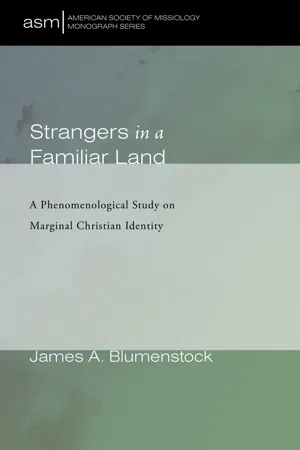![]()
1
Identity Formation in Sociocultural Perspective
Introduction
Religious identity formation in contexts of marginalization is a fundamentally social phenomenon. Conversion, as we will see in this book, introduces two revised states of social existence: social segregation on the one hand, in that it displaces the convert from pre-existing religious and social identities, and social integration on the other, in that it immerses the convert in a new and transformative intersubjective community of saints. As we begin our study of this phenomenon, therefore, it is valuable for us first to survey the relevant theorizations within the social sciences to see how they might assist in our adumbration of the structure of marginalization within the Thai context. In this chapter, I will review literature in the disciplines of sociology, anthropology, and psychology to reveal the most relevant theorizations as they contribute to an understanding of the Thai Christian experience of in-marginality.
The chapter is structured into two primary sections: marginality and sociocultural identity formation. In the first section, I will cover marginality theory within three theoretical traditions: stranger as newcomer, “marginal man,” and liminality. In the second section, I will survey both the social constructivist and social identity approaches to identity formation, both of which prioritize the essentially social nature of the self-concept.
Marginality
Since the early twentieth century, due to an increase in social mobility, mass communication, and ethnic and political conflicts, sociologists and anthropologists have developed a heightened awareness of the role of the margin for understanding culture and society. Social structures are no longer perceived as stable and exhaustive definitions for all people in a given time and place. Instead, for each social structure, there exist those who live “on the hyphen”: neither fully defined nor fully accepted according to the prevailing definitions and identifications of the dominant groups. These individuals may be in a marginal position due to their race, ethnicity, religion, or simply because they are newcomers, but in all cases, they experience unique social and psychological effects. This section will delineate the sociocultural concept of marginality as expounded in three distinct, albeit related, theoretical traditions: the stranger, the “marginal man,” and the liminal. I will trace each theory according to the works of its major contributors, highlighting similarities and differences among the traditions as well as key concepts relevant to the phenomenon under investigation.
The Stranger
Modern sociology’s treatment of marginality arguably began with Georg Simmel’s (1858–1918) concise but influential essay entitled “The Stranger.” The German philosopher pictured society as a web of interactions between people. The form of these interactions could be isolated from their content allowing the sociologist to study relationships that differ in substance but display the same formal properties. This approach, known as formal sociology, underpins Simmel’s treatment of the stranger as an isolated social type or a “specific form of interaction” that may appear in different societies at different times throughout history but displays similar behavioral patterns.
For Simmel, the stranger is not a wanderer who comes and goes but the person who comes today and stays tomorrow. While being close in distance, the stranger is also remote. The stranger’s position as a member of a society involves being both outside it and confronting it. Economically, they are the outside merchants who settle down in the place of their industry while retaining a sense of mobility. Because they are not committed to the particular values of the group, they interact with the group objectively, openly, and with a high level of freedom. The nearness of the stranger allows the group to identify with them according to certain general characteristics such as national, social, or generally human qualities, but their farness is experienced in the lack of personal and particular relational features held in common. The stranger par excellence, according to Simmel, were the European Jews who, despite being resident in European nations, have historically been categorized, in the first place, as inhabiting a particular social posit...
